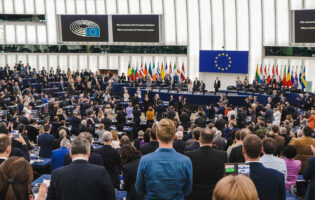Draghi to the Rescue

Alexander Privitera
AGI Non-Resident Senior Fellow
Alexander Privitera a Geoeconomics Non-Resident Senior Fellow at AGI. He is a columnist at BRINK news and professor at Marconi University. He was previously Senior Policy Advisor at the European Banking Federation and was the head of European affairs at Commerzbank AG. He focuses primarily on Germany’s European policies and their impact on relations between the United States and Europe. Previously, Mr. Privitera was the Washington-based correspondent for the leading German news channel, N24. As a journalist, over the past two decades he has been posted to Berlin, Bonn, Brussels, and Rome. Mr. Privitera was born in Rome, Italy, and holds a degree in Political Science (International Relations and Economics) from La Sapienza University in Rome.
Alexander Privitera is the Washington-based Special Correspondent for the German news station N24 and is a frequent contributor to AGI publications and events.
For Europe, the coming year promises to be another troubled one. Things could get worse before they get better. In the unlikely event that the euro zone falls off a cliff, don’t blame the European Central Bank (ECB). Its new head, Mario Draghi, points the finger at Europe’s political leadership, who he thinks is guilty of a chronic inability to craft a credible, comprehensive plan, and stick to it.
This, in essence, is the message that the head of the ECB was pushing in his first public relations offensive since he took the helm of the Frankfurt-based European Institution less then two months ago. After an interview with the Financial Times on Monday afternoon of this week, Draghi fielded questions from European members of Parliament. Many investors hoped he would use the opportunity to offer some soothing pre Christmas remarks, like the correction of his previous, rather skeptical statement on the ECB’s sovereign bond buying program. Instead, Draghi warned of the consequences of a euro zone break up and stressed that the SMP (securities market program), under which the ECB buys sovereign bonds on the secondary market, is “neither eternal nor infinite.” For financial markets, and some anxious governments on the periphery of the euro zone, his words were a cold shower. Once again, Draghi reiterated that the Bank will not put a floor under rapidly falling bonds. Rather, in Draghi’s own words, the Bank’s role is to “reactivate the monetary policy transmission channels. So, as long as we see that these channels are seriously impaired, then the SMP is justified.”
To put it simply, the ECB is opening up the floodgates, but with the specific intent of keeping the wider financial system, and particularly banks, afloat. The banking sector is currently the central bank’s main cause for concern, and the Eurotower in Frankfurt is getting ready for a very rocky start to the New Year.
Given the central role that European banks − now dramatically weakened − played in the recent fire sale of distressed bonds, propping them up decisively could also help to stop the bloodbath on bond markets and bring down yields. The strong demand at the last Spanish bond auction suggests that in the wake of the ECB’s decision to provide unlimited, cheap liquidity for banks, some level of confidence has already been restored.
Of course, the ECB will not stop buying distressed government securities anytime soon. However, once again Draghi has made it quite clear that the central bank will not act as the lender of last resort. Markets should start getting used to Draghi’s modus operandi. In an effort to include rather than isolate the hardliners at the Bundesbank, the ECB, even under its new leadership, will continue to be mindful of the differing positions in the governing council, and continue to partially cover the tracks of its so called “non-standard measures”.
In fact, one central feature of Draghi’s evolving strategy to deal with the crisis went largely unnoticed. By lowering interest rates again and pumping additional liquidity into the financial system, the ECB created the environment for a further decline in the value of the euro. This should be seen as part of the solution rather than the symptom of a deepening crisis. According to Harvard economist Martin Feldstein, it is in fact the only way forward for the euro zone. A weakened Euro not only benefits those peripheral euro zone countries now scrambling to regain some trade competiveness on global markets and desperate to avoid a prolonged recession, it should also help Germany’s exports in a slowing world economy.
Now that the ECB has taken decisive action, Draghi expects the political leadership to do its part. The EU needs to do its homework, and countries must step up the pace of fiscal and structural reforms. In its latest financial stability review, the ECB stresses that “a swift and complete implementation of the measures announced by the European Council and euro area Heads of State or Government on December 9th would mitigate (…) risk considerably. (…)any emergence of protracted domestic political uncertainties in vulnerable countries, combined with fiscal consolidation lagging behind EU recommendations and program plans, would further undermine confidence in the adjustment process.” In a further sign that central bankers in Frankfurt are frustrated with the political leadership, the report lists a long series of summit decisions that have been only partially implemented.
The main victim of poor political leadership is in fact the European Financial Stability Facility (EFSF), which as Draghi sees it, should act as the lender of last resort for sovereign bonds. But the facility has been plagued by significant funding problems − so much so, that some observers have predicted its imminent death. Not Draghi. He insists that nobody should give up on the bailout fund, although he does admit that delays in making the EFSF operational have only increased the resources necessary to stabilize markets. “Why?” he asks, “Because anything that effects credibility has an immediate effect on the markets. A process that is fast, credible and robust needs less resources.”
Unfortunately both speed and credibility remain elusive in the resolution of this deep crisis. The recent commitment by European leaders to provide the International Monetary Fund with an additional 200 billion Euros, to be matched by investors such as China and other emerging markets, is already running into problems. The U.S. refuses to commit any funds, and the UK is now backpedaling on prior commitments. The result is that what was supposed to be a robust war chest is now shrinking before our eyes. Ten days after the summit decision to boost the IMF, European finance ministers have only managed to put together 150 billion Euros. This sum is far too small to pull the IMF into any credible program designed to aid Spain and Italy. It is not a good start to this new phase of the crisis. And it is an all too familiar pattern. Governments are quick to make bold announcements about financial commitments to tackle urgent liquidity shortfalls, but rarely deliver on their promises.
Draghi has more to say about the shortcoming of Europe’s leaders. He argues that the way in which decisions have been taken, and which decisions have been made first, has also contributed to a worsening of the situation. He believes that the first step should have been to put a firewall in place, namely the EFSF. Then banks should have been asked to recapitalize, and only afterwards, should a decision have been made about private sector involvement (PSI) in the euro zone bailout. Instead, following their long walk on the beach in Deauville more than a year ago, German Chancellor Angela Merkel and French President Nicolas Sarkozy decided that private creditors must take on some losses in their sovereign bond holdings, and as a result, private sector involvement became part of the strategy too early in the process. Going after the bankers made good politics amongst voters, but bad policy when it came to dealing with unsettled markets. In fact, domestic considerations have too often trumped the need for a pragmatic approach to this crisis, and limited the ability of Europe’s political leadership to stop contagion from spreading to Europe’s core.
The ECB, under Draghi, has chosen to push politicians to do their part, rather than offering up the Bank as the ultimate problem solver. Draghi is an able tactician. He played a central role in removing former Italian Prime Minister Silvio Berlusconi from power, a man who many, including Draghi, saw as an integral part of the Italian problem. Now he is attempting to pressure European leaders to make some tough decisions about the fiscal compact and the EFSF. He is, rightly so, very reluctant to allow any blurring of the lines between the central bank and the political class. Doing so would jeopardize his own credibility, and that of the central bank. And these days, credibility is a truly precious commodity, and one that is in extremely short supply.









